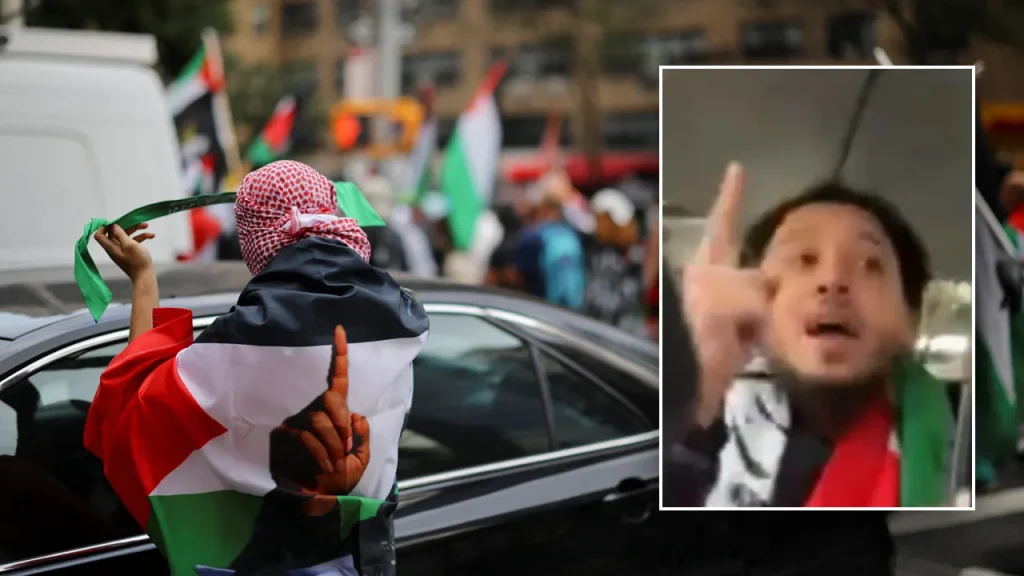Palestinian American’s 17-Month Sentence for Antisemitic Attacks Stirs Debate
In a case that has highlighted tensions between free speech, activism, and hate crimes, 20-year-old Palestinian American Tarek Bazrouk will serve 17 months in prison after pleading guilty to attacking Jewish protesters at pro-Israel rallies in New York City. Though the charges could have resulted in up to 30 years imprisonment, Bazrouk accepted a plea deal that significantly reduced his sentence. The case has sparked debate about appropriate consequences for hate-motivated violence and the fine line between political protest and criminal behavior.
The attacks occurred over a nine-month period at various locations across New York City, including outside the New York Stock Exchange, near Columbia University, and at a demonstration on Manhattan’s East Side. Court documents paint a troubling picture of Bazrouk’s attitudes, claiming he “identified himself as a Jew-hater,” and in text messages presented by prosecutors, expressed extreme antisemitic sentiments. One of his victims, Roman Efraimov, described being targeted while wearing an Israeli flag and Jewish star, calling the experience “disgusting.” Another victim, Elisha Baker, shared similar accounts of unprovoked assault based solely on his Jewish identity.
During his court appearance, Bazrouk offered an apology to his victims, saying, “I’m sorry, guys, and I hope that you forgive me for my actions,” while promising the judge that “if you give me a chance, you will not be disappointed.” However, Efraimov expressed skepticism about Bazrouk’s sincerity, claiming the defendant “smirked” at him during the proceedings. This disconnect between Bazrouk’s stated remorse and his perceived behavior in court underscores the emotional complexity of hate crime cases, where victims often doubt the authenticity of apologies given during sentencing.
The case was further complicated by revelations about Bazrouk’s background and circumstances. Authorities reported finding $750,000 in cash at his apartment along with weapons, and noted his pending charges in Hartford, Connecticut, including robbery, assault, and operating a drug factory. Meanwhile, support groups like the Palestinian Youth Movement framed Bazrouk as a victim of “political repression” who “has been held in a federal prison for his activism,” suggesting the case was about silencing pro-Palestinian voices rather than addressing genuine hate crimes. His attorney, Andrew Dalack, denied allegations that Bazrouk supports Hamas and Hezbollah and argued for a significantly lighter six-month sentence.
Judge Berman, in delivering the sentence, emphasized a straightforward principle: “If you assault somebody unprovoked just because that random somebody is an actual or perceived Jew because you, the assaulter, hate Jews, you are very likely to go to jail. It’s that simple.” This statement cuts through the political contextualizing from both sides, establishing that regardless of one’s political views or cause, physically attacking others based on their religion or ethnicity remains illegal and punishable. The 17-month sentence represents a middle ground between the maximum possible penalty and the defense’s request, acknowledging both the seriousness of hate crimes and factors like Bazrouk’s age and plea.
For the victims, the sentence carried significant symbolic weight beyond just their personal cases. “The court sent a message today,” Baker stated, “and that is, if you assault Jews on the basis of their Judaism — if you assault people like me because I wear a kippah and wear a blue square — you will be held accountable. And that is the promise of America.” Efraimov added a pointed observation about the selective nature of Bazrouk’s expressed concerns: “He said he cares about the suffering in Palestine, but he didn’t say anything about the families of those murdered by Hamas.” As antisemitic incidents continue to rise globally amid heightened tensions in the Middle East, this case demonstrates the ongoing challenges in balancing passionate political advocacy with respect for human dignity and legal boundaries, while ensuring that hate-motivated violence faces meaningful consequences.


